#a realistic one but idealist nonetheless
Explore tagged Tumblr posts
Text


I've been saying I love this MR set so much especially the 2nd MR Private Messages for every ML, but since I am Artem biased of course the one I spins around in my mind is his card.
I LOVE how the MR made a callback to his 2nd Bday Card aka Day and Night which is my numero uno card for Artem (in glb server).
In Day and Night SSR, in the face of Elice White fell from grace, Artem had to become the informant therefore mingling with these people, playing the role that caused him misery, and found himself lost and that time, Rosa found him deep in thoughts, alone. I always like it because Artem always has this habit of dealing with dangerous things or might hurt him on his own, Rosa finding him and not letting him being alone is important of Artem letting her see his vulnerable parts (which later follow through in his Sweet Chapter 2 SSR where he admitted that in the past asking for help was admission that he wasn't good enough *spoiler* his Solo SSS would follow through of this theme, showing the character growth.)



"Every time I wander to the edge of the abyss, peering into it.... You pull me back just in time."
After what happened during Day and Night SSR, Artem had been lost, often distracted by his own thoughts because the experience affected him that much. What happened with Elice White shaken him, but the one who pulled him back before drowned by his worries and fear was Rosa, not letting him focus on it, instead the fact whatever may come, whether its hope and despair, they would go through it together.
Anyway it became a Day and Night SSR appreciation (because I am actually insane about this card), please read it if you're interested in Artem's mindset and morality, and the past case that has shaped him and what kind of person he is as law practitioner. Also what kind of worry that he has for the future may come.
#tears of themis#tot#artem wing#zuo ran#rosa qiangwei#i love my cute and sweet zuo ran but the zuo ran writing i love the most always the one who dig deeper into his psyche and morality and#experience and things he has to face in the face of justice and ideals that he holds#he is an idealist#a realistic one but idealist nonetheless#*craughing* everyday i am reminded how aymeric and artem are similar and then i feels like i need to drink multiple glass of coffee#also for the record as whole the current faves card of mine is tie between day and night and his 4th bday card www#artemrosa#kind of but hey!#anyway i'll be back being noisy when his sweet chapter 3 ssr and dragonbreathe ssr come in glb
15 notes
·
View notes
Note
John Constantine and Batman.
Constantine - I haven't read much of the character's solo series, just his appearance in Alan Moore's Swamp Thing, but I feel like it would be fun to do a riff on Altman's Long Goodbye with him. if this already exists nobody tell me.
Batman - Jesus Christ just let him investigate some crimes that actually help the people of Gotham that are unique individuals. enough of this nonsense about the "Bat-Family" (kill me) and these endless riffs where he's just constantly discovering some untold secret about his parents or ancestors or his past adventures that matters to literally nobody except him. (not saying that stuff cannot be fun, but it's been done to death, and it gets away from what I find resonant about the character, which is that he's an idealist wearing the mask of a realist who is trying to force an expressionist hell into changing, no matter how little it budges.)
a half-cocked dreamy idea (very heavily indebted to Morrison's portrayals of the character as well as their All-Star Superman series) is a dying Bruce, stricken with illness (could be cancer, could be sci-fantasy nonsense for the inevitable return, but I think cancer is most thematically fitting), goes through his final labors in an episodic sequence of 8-12 lingering mysteries and cold cases, each one centered on a different person (or set of people) [to get across the 'everyone matters' ethos] and emphasizing a different aspect of his character (to emphasize the "persona" element of the character).
some of the stories may involve his rogues but definitely not all of them (and ideally not the final one). but I think since they are such clear confrontations with different aspects of himself - and my preferred takes on Batman are a sort of psychoanalytical expressionism - that it would be nice to offer some resolution to those: a confrontation with Ivy, a being who has transcended her humanity in a non-identical way to Bruce (or rather beyond him); a Bane who is essentially running a Gotham equivalent of FARC; Two-Face, who isn't capable of being made unified but is perhaps capable of being brought into balance; and of course Da Jokah, who can only be overcome with a Superior Gag.
as the disease advances the visual representation of Gotham and its people gets starker, more surreal and psychidelic a la Caligari, and falls apart as Bruce's health breaks down. he inevitably loses - the hell only budges by an inch - but it's a measurable inch nonetheless, the project of moving it is shown to be in some way worth it. leaves the mantle of Batman to Cassandra Cain after death.
then he begrudgingly forms a new Dynamic Duo with Deadman and they do ghost nonsense together, or something, I dunno. suffer!
11 notes
·
View notes
Note
🔪 - Any characters you don't like?
💬 - Any fan theories you've had or currently have?
🎤 - Any hot takes?
Hello anon! Thank you for sending in an ask. I'm going to answer 🔪🎤 first as they will be shorter answers and then dive into the fan theory part that will have a read-more break because it'll be pretty long (with screenshots).
There are a few character in ITGR that I don't like, but one of my least favorites, if not my least favorite, is Chase. Who, I do notice, is quite the fan favorite, possibly second to Brook. SORRY for the slander if you like Chase by the way uhmm I definitely understand the appeal of his character, in season one, he's a self-righteous idealistic man who takes it in his own hands to do anything he can to improve the state of the world regardless of whether people see it as morally correct. Hell, I like Light Yagami (not Shiro mentioning something from another fandom on his ITGR blog? Breaking his own rules, eh?) even, so of course I can see the appeal of a character like this, but after season three starts, that whole image collapses. He loses his plot involvement and direction as a character, in the end no longer caring enough about the world to take the steps he did before to improve it. While this is a fair development of a character like him, in ITGR, it just renders him near useless. After the arc where they attempt to uncover Scarlet's backstory, he turns into an accessory purely as a motive (taking care of him) for Scarlet, and to an extent holding her back. Going from whip-smart detective with unrealistic ideals to A Guy. A nerd who kinda bums around as the ITGR discord would describe it. It's all a realistic turn of events but nonetheless that doesn't make him a likeable character to me. Not saying that a good character has to necessarily be plot relevant and etc. at all it's just my personal preference that they are.
Sorry. Going to yap a bit more about Chase regarding the hot take I'll be talking about. I personally do NOT think Chase should return and that Zero is Chase, and I don't think he should be from a storytelling perspective. Many have talked about how much they'd like Chase's return and have been hoping for Zero to be Chase, not taking into account how Chase, if he returns, because there is just no way for him to be plot relevant at all as of season four's current plot. All he'd do is be an accessory to Scarlet and hold the plot back. It also feels disrespectful for him to be brought back after that very heartfelt send-off in season three, just taking away all its merit and significance. If Zero turns out to be Chase—I think that takes away the whole merit of his character. His largest appeal to, at least me, is the unsteadiness of his sense of identity, careening between the feelings of a dead man and his own role as an archreaper. I don't know about you, but I think it'd feel very invasive to feel the emotions of someone else that you wouldn't have otherwise, and then being forced to put those emotions (and memories) into conflict with the current identity you have (for Zero, as the most powerful archreaper, directly in opposition to Scarlet). Grave has set up such potential with Zero already, and a reveal that he was actually Chase all this time would be so disappointing IMO.
Fan theory time. Discussing archreaper Three and Five's identities... this is a theory shared by the ITGR discord as I'm actually not great at making theories aha.
FIVE'S IDENTITY
I haven't seen a lot of theories about Five's identity actually. Out of what I know, I can infer that it'd probably be pretty likely in some readers minds that Five could be Ana, considering that she was sentenced to the fifth circle (Episode 11).
However, I propose a different idea: that Five is not Ana, but Natasha (Brook's sister).
Natasha has a very similar sin as Ana, who was sentenced to the fifth circle for killing her own son. If qualifications for the fifth circle is killing a family member, whether indirectly or directly, then Natasha fits the bill (with killing Brook by ordering a subordinate to do so).
In the first archreaper appearance, Episode 155, Five's first words are "...Cease your squabbling, fools," and, "It's unsightly. We should behave with the same status as our stations imply." While we never heard Natasha directly talk to Brook within his backstory, this sounds quite, pretentious? Comes off high and lofty, as if coming from a "woman of high nobility," as Jordan notes. This falls in line with Natasha, the head of her clan and company, who can be assumed to be, if not nobility, then at least rich enough to seem so.
Five's sihlouette, at higher brightness, has hair very similar to Natasha in Brook's backstory.

Comparing that, to:

It's not a perfect match, though it isn't out of the realm for Natasha's hairstyle to have been altered a bit, as Everette definitely underwent a more pretty drastic hairstyle change as well. Now, if we look closer at that image of Five at a higher brightness, if you can, look closely at her pupils: the shape of a crosshair.
Natasha, in Brook's backstory, has been seen with guns:


It would make sense for the archreaper with crosshair pupils to have used firearms in their life, and use them in the afterlife as their main weapon.
Now, examining the silhouettes revealed on Episode 194, here is Five's:

[Image ID: Everette as a snail explaining Five's temperament with her silhouette; a woman with large horns and hair in a braid that falls down to her knees. She appears to be wearing a dress. Everette says: "Five is really scary! She's got a sharp temper! She also thinks she's better than everyone else, which... I dunno, she is pretty smart, but if I talked to her for too long, I think I'd cry...!" The background is bright pink.]
Five's hair has changed, from Episode 155, it being down, to 194, it being braided. That's fine, Vincent's eye color changed from brown to light orange to match his little sister better, Grave has done this before. Also, the background, bright pink, is probably her demon, which is a very similar color to Brook's accent color, yeah?
As for the personality description, we don't know that much about Natasha's temperament, but it fits well for a businesswoman who ran a company. Whip smart and with a sharp temper. Probably makes subordinates cry, or at least fearful.
I think... I've solidified my case of Five's identity pretty well with what we have released at the time of writing this. It also makes sense plot-wise as a way to reinvolve Brook into season four's plot, by exploring parts of his past once again. Their (likely) confrontation will be very interesting to see in the future.
THREE'S IDENTITY
I think Three's identity has been most popularly theorized to be Natasha, but with all that I've said to convince you of Natasha being Five, then who do I think Three is?
I've already disproved Natasha as Three pretty clearly, as her sentence would likely be greater than the third circle for murder (Liam was sentenced to fourth for murdering someone random, while Ana was sentenced to fifth for murdering her own family).
This will be mostly based off my own conclusions and inferences rather than concrete text evidence, so take it with a grain of salt if you will, I believe Three's identity to be Ashe's daughter.
It would make sense plot-wise, if Natasha is a way to bring back Brook and make him plot relevant, than if Three is Ashe's daughter, it could be a big arc of character development for him. At the moment, Ashe's role in season's four plot is kind of... boring? He's kind of just there to fight, not super useful, but if he encounters someone in his past he'd be made plot relevant. Both a backstory reveal and a way to explore Ashe's character.
The only concrete evidence we have of Three being Ashe's daughter is from Everette's description of her in Episode 194.

[Image ID: Everette as a snail explaining Three's temperament. Three's silhouette is displayed as a woman with hair let down reaching her lower back and wearing some sort of dress, probably a kimono. Everette says: "Three is a very put-together lady, and she doesn't speak much. Despite that, I can tell she isn't from the modern day!" The background is a red with a slight pink tint.]
The personality doesn't give much, Ashe's daughter could be anyone with any kind of temperament. However, Everette notes that she notably isn't from the modern day, and she is the only archreaper to which Everette says this. In addition, her silhouette seems to be fitting for someone wearing a kimono, which would make sense considering the time period the Ashe was from in Japan.
I don't have much more to say about Three, but, Jesus christ, this was a huge fucking post. Sorry for spilling this huge yap onto you, anon, and if you did read it all the way, thank you for sending in the ask! The amount of times I've said plot in this post is ridiculous
#im the grim reaper#ask#anonymous#spherical living concept#chase itgr#gets stepped on no game massive loser#zero itgr#five itgr#three itgr#en speaks
14 notes
·
View notes
Note
Hi! Can i request a romantic matchup for star wars, hp marauders and DC? :3 (sorry if i make any mistakes english is not my first language :3) Anyways, about me: I'm bisexual and demisexual. She/her pronouns but neutrals are fine. Infj 4w3, big 3 are; gemini sun, taurus moon, sag rising. I have short dark hair and I loveeee to style it like marilyn monroe (I'm obsessed with old hollywood) I have olive pale skin and dark brown eyes, I'm 5'7 and skinny but not too much mostly because I'm a figure skater! idk i think im really pretty! Mexican with italian and native family. Older sister that basically took raised her little brother and depressed mom (damn.)I love my family and basically love human interactions lmao. Extrovert (? idk) my friends describe me as likeable, charismatic, clumsy, witty, confident, idealistic, caring and nice. I love making people feel comfortable and welcome. People that don't like me may describe me as argumentative, annoying, stubborn, greedy, with ego or even mean and i'm not going to deny anything of that tbh. I loveeee feeling pretty and I'm a girly nerd girl, champagne colors, black and pink are def my thing. I love political science, neuropsychology, literature, women history and pyshics. My specials interests are: old hollywood, star wars (mostly obi-wan kenobi lol) manifestation, barbie and Sylvia plath. And yes, I'm autistic but I work with it really well. I love to perform and all that stuff, I was in a band, playing guitar and singing, musicals, figure skating, ballet etc. I don't talk about my problems to anyone, i just write them down because i don't really like to worry people and i know it's not healthy but idc. I always manage to be optimistic but realistic. I'm a perfectionist and I reaaaaally hate doing something wrong so that's mostly when I have my mental breakdowns lmao. Quite touchy with people i really like, hugs, touching faces, playing with hair, toying with hands, but I always make sure that they're okay with it! Also i'm quite bubbly and flirty but I'm not really interested on someone(mostly because now relationships are really weird, help.), I'm really specific with what i want and i have high standards. I hate: thunderstorms(im really scared of them) crowded places were i'm alone, really negative people, pick me's, pumpkins, immature people, facists, last minute surprise, people with horrible communication skills. Sand and the beach. Maps and driving, unfair stuff, sexism and men being stupid. I love: summer and spring, animals, makeup, any kind of music but my favs are: mcr, britney spears, fiona apple, the cardigans, marina, lana del rey, ariana grande, nine inch nails, the cure and bikini kill. Stawberrys, gossip girl, mexican soap operas (I LOVE RUBI AND TERESA!!!) comics and nerdy stuff (It all started because i wanted to prove a boy that I hated that I knew more about star wars than him and I ended up watching all the movies, series and reading all prequels books lmao)playing legos with my little brother, baking and having debates with my literature teacher.
Hello! I'm sorry this has taken so long to get posted! I hope you like it nonetheless! (I also love old hollywood! I love marilyn, audrey hepburn, and cary grant!) Enjoy! <33333
---
(Romantic);
---
Star Wars;
Obi-Wan Kenobi:

🌙 You met Obi-Wan on a random planet that he was visiting for some undisclosed reasons; you were walking with your friends past him, and as you both passed each other, you made eye contact - the world seemed to slow down, your eyes locked on one another - love at first sight
🌙 You didn't see Obi-Wan until when you and your friends we drinking in the nearby cantina; your friends gestured to the mysterious man across the bar, and you followed their line of sight - seeing the man that you had passed earlier that day, your friends hyped you up to go over and talk to him
🌙 The conversation floooowed, and I mean flowed, the instant connection that you had with this man was undeniable and intoxicating - you couldn't get enough of his voice and how his words seemed to grapple and pull you right in; it wasn't until later in the night that you found out his name, Obi-Wan Kenobi
🌙 Months later, Obi-Wan, trapped in the Jedi Laws, tried to hide how much he enjoyed your presence, but it was difficult, in the end - risking his Jedi life and duty - he confessed who he truly was, but you still loved him all the same
🌙 Your and Obi's relationship was kept a secret, even from most of your friends, though Anakin quickly figured it out - you and Obi were a perfect match, always there for each other, always understanding and caring towards one another; you both loved each other to the moons and back... And then some
---
Harry Potter (Marauders);
James Potter:
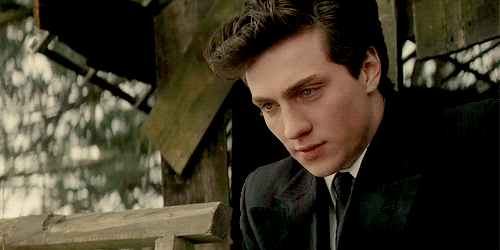
��� You met James at Hogwarts, and you instantly felt a connection between the two of you - it wasn't long until the both of you were flirting with one another, joking around, having a few laughs; the feelings you had for each other were unspoken, but understood
✨ You and James were inseparable, whenever you could, you'd be together, joined at the hip, no matter the time of day - and you were always touching each other in some way, holding hands, playing with his hair, his arms around you; you'd often squish his cheeks together, James would always blush at the contact
✨ When spending nights together - either just cuddling or talking about your favorite music, comics, or your love for strawberries - and a thunderstorm arises, he is always there for you, distracting you or covering your ears while holding you; if a storm is coming, it's like a sixth sense
✨ During the summer, you and James meet up as much as possible - you get the opportunity to show him your favorite music, movies, and shows - sometimes if you're lucky, James let's you do his makeup
✨ James and your little bro would probably get along beautifully as well, and I would bet that James would love to play with Legos with you and your brother - even though he has no idea what they are in the beginning XD
---
DC;
Harley Quinn:
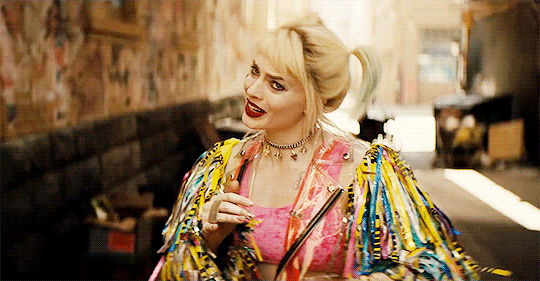
♥ You met Harley at one of her roller derby games - being a figure skater, you enjoyed seeing people roller skate - you immediately caught her eyes as she raced around the track; your Marilyn Monroe styled hair was amazing to say the least
♥ She had to tell you how much she loved your hair, and she did after winner her match, meeting you out in the parking lot before you and your friends left; she made sure to compliment you (a lot), and even gave you her card, which you took with a smile
♥ Her card didn't have any number or address, so you believed that it was going to be difficult to find her, but you were surprisingly wrong - small world, even if it was Gotham - you met her at this small convenience store, where you found her waiting for a breakfast sandwich
♥ You and her decided to walk around Gotham together, but the outing was short lived as she was getting chased by like ten people - you didn't see Harley for a long while, but when you did, she had a Hyena and a kid (and a nice car)
♥ You joined Harley and Cassandra (and Bruce) on their adventures, stealing marshmallows from stores, going around town causing slight chaos, and just having a grand ol' time together
---
#cute#fluff#x reader#request#requested#matchups#matchup#star wars#harry potter#hp#harry potter fandom#harry potter marauders#dc#dc comics#obi wan kenobi#obi-wan#james potter#harley quinn#obi-wan kenobi x reader#harley quinn x reader#james potter x reader
8 notes
·
View notes
Text
Idealistic Vs. Realistic: The Passionate Shepherd to His Love and The Nymph’s Reply to the Shepherd
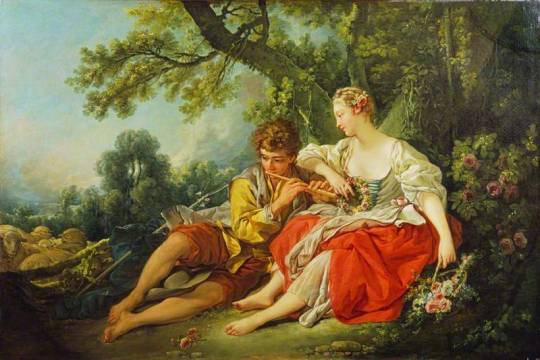
Each person has a unique personality, perspective, and set of experiences that make them different from everyone else. We come from different families, have different ethnic backgrounds and cultures, and have different personal experiences. Likewise, we want different things from life and different things from each other. We have different dreams, goals, and expectations.
In a literary sense, “The Passionate Shepherd to His Love” by Christopher Marlowe and “The Nymph’s Reply to the Shepherd” by Sir Walter Raleigh are two connected but contradictory poems that are prominent from the Renaissance literary period. Even though two works refer to the same subjects, they have different functions as one poses a question, while the other answers it. Forby, two perspectives were driven into conflicting ideas where readers may have realization of their point of preference.
The two poems are unquestionably promising pieces of literature and I think readers should not view the points as a conflict between the authors themselves. In my perspective, we can have our preferences and we can even choose our side between the two contradictory poems. Thus, literature is present for people not just for pleasure but also for realization.
Hypothetically, I observed that the differences in the two poems could be seen as reflecting the differences in their respective authors. Whereas Marlowe was a dedicated poet and playwright, for Raleigh, writing was only one of his many interests and passions. Marlowe came from humble roots and never rose to power the way Raleigh did, nor did he travel the world or experience firsthand the hardships of war.
In the same matter, Raleigh also had more documented experience in matters of courtship than Marlowe, such as his longstanding relationship with Queen Elizabeth I and his marriage to Elizabeth Throckmorton. Perhaps this experience gave him insight into the realities of love that Marlowe did not have or was not interested in considering. Raleigh might also have viewed Marlowe's poem as naive and juvenile.
In a nutshell, these poems taught us that there are no superior nor inferior perspectives. We may differ in our interpretation which can influence our acceptance of other people's thoughts. Nonetheless, we have our own riddle, which makes us unique.
11 notes
·
View notes
Note
No, not exactly what I meant. There is some women who do not actually like feminism or want to be part of it. In America I guess it some religious groups or seriously republican, but there is others around the world. They don't want to be responsible for themselves. Some have this idealistic view of the past. You don't know what I'm talking about?
No babe, I do know.
I was talking in very realistic terms when I answered that ask.
I believe a woman who has worked since she was a teenager in degrading filmography simply for the mere possibility of getting noticed, is a woman who wants a career. A career wherein she becomes famous, nonetheless.
I believe a woman who has garnered enough momentum to land a Netflix TV show as the lead, is a woman who wants a career.
Which is why your argument is invalid.
You're addressing it as if Alba never wanted a career, when in fact, she worked quite hard for the minor one she had, at a certain point in her life.
Which proves she did in fact want one.
What I condemn is that she has now chosen to give that up to be a breeding bunny to a high-level Hollywood actor, who is 16 years her senior, and that it does not qualify her as being a "traditional" women.
She wanted different but now settled for less, clearly.
She settles for being known as an actor's girlfriend or fiancé or wife.
Which proves she is oppressed.
With the work that is proven she has done, I do not believe this was her fucking "lifes dream" (it rarely is for most women)
But I do believe it is now the life she has settled for because she's realized her own talents can't bring her further than they did, and she now needs a more popular man to fulfill the rest of her dreams.
Which is anti-feminist.
On top of that, she is a racist and so are her friends, so you know... She's a terrible person, overall.
But spoken from a truly, blindly, women's perspective, no I do not think she lives up to the expectations of a true feminist.
And speaking from a personal perspective: If I had ever done any work in the same field as my boyfriend/fiancé/husband, it would fucking tear me to pieces if I was only known as his girlfriend/fiancé/wife/significant other/friend.
She is okay with being known as that. She is even perpetuating that narrative.
Which is surprising, considering how much she clearly worked for her career before meeting that middle aged white man who so many people worship for no reason.
#mandy answers#chris evans#alba baptista#to be clear#i cant stand either of them#but this is an important perspective#she chose to mold herself to fit his needs#and is now presumably giving up her life for him#i hope its worth it#but truth is it most likely wont be
12 notes
·
View notes
Text
Review: The Outlaws of Sherwood by Robin McKinley

I first read this book when I was about twelve and I remember not caring for it at all – Disney’s Robin Hood was one of my favorite movies, I’d eagerly devoured several other print versions of the legend and in comparison, The Outlaws of Sherwood seemed boring, tame, and unadventurous. But reading it again as an adult has given me a new perspective and I think I can now say that this book is actually quite good. Robin has no dreams of becoming a famous outlaw or a legendary marksman. He’s just a young Saxon man trying to survive the Norman occupation of England. But when the bullying he endures from his fellow forest rangers escalates to an accidental murder, he flees into the depths of Sherwood Forest where his best friends, idealistic miller’s son Much and discontented noblewoman Marian, convince him that his impulsive act of rebellion could become a symbol for something much more powerful. And as more people gather in the woods, each with their own cause or hurt driving them to risk everything, it seems as though Much and Marian may be right. This book attempts a more realistic take on the Robin Hood legend than some other depictions, examining in a very subdued way how legends are built and heroes forged from the collective efforts of larger groups and of the value of symbols to a movement, as well as the ways that those of different backgrounds and talents can nonetheless contribute – cooking, carpentry, and contacts with the outside world prove to be as valuable to the outlaws as trick shooting in many cases. What my younger self interpreted as a frustrating lack of excitement and flash seems now to be more of a simple, down-to-earth approach to the story (although still peppered with the author’s signature wry humor and romanticism). The result is an oddly relaxing story that nonetheless still delivered on some tense moments. Also worth noting is that this is perhaps the first book I’ve read by Robin McKinley where I didn’t feel like the ending was rushed, and in fact the climax and denouement felt very well-paced to me. The only major critique I have for this book is actually the main thing that bothered me as a child as well, and although the sharpness of the complaint has blunted since then, the point remains. Towards the end of the book, several of the supporting characters take increasing prominence in the narrative, to the point that by the climax, most of the story is from their perspective. While this is, I believe, deliberate, to emphasize the theme of Robin Hood being a collective symbol rather than a single man, I started to feel as though Robin (who I did quite like with his practical cynicism and reluctant soft heart) was becoming a bit player in his own story. Nonetheless, The Outlaws of Sherwood is a really solid read for fans of Robin Hood or of historical fiction with a fairytale-esque bent. It brings little new to the table, but the comfortable prose and likable characters more than make up for it.
Rating: 8/10
3 notes
·
View notes
Text
You know what I find interesting about Roy Mustang? He's a downright optimist. Here we have a broken man who has committed literal atrocities, and still has the singular hope that as the Fuhrer, he can change his country for the better (and that the people of Amestris will actually follow him).
Which directly challenges Maes Hughes, who in fact, is not an optimist, but a realist. His cheery demeanor (at least, in my opinion), acts a shield as he protects his loved ones from the darker side of his past and profession. He's very calculated and intelligent, and is able to see that some situations are messy and complicated and cannot be amended with just an innate desire. But he allies himself with an idealist nonetheless, to help Roy rise to the top with the "right people."
And then we get to Riza, to where it gets a little more complicated. Riza has the same sense of realism as Hughes, yet has the same hope that Roy can change Amestris for the better. Her motivations; however, seem to come from a place of guilt and self-destruction. At least until end of the series, Riza's entire goal in life is set on getting Roy to the top to right the wrongs of Ishval. If that fails, her life has no purpose.
Which is why when we hit the Promised Day, both Roy and Riza are faced with the very worst of themselves, and they chose to believe in each other. And when they are both are their very weakest (Roy's blind and Riza's somehow still alive after her throat just got sliced), they are at their strongest when they stand together.
Which then puts them in the right place in regards to rebuilding Ishval--in the realization that it is when they have hope in each other and for the future, they can succeed.
"This place just reeks of optimism" indeed.
468 notes
·
View notes
Text
'My Mister' and Incorporating Life’s Painful Truths
by Isobelle Cruz [April 29, 2022]
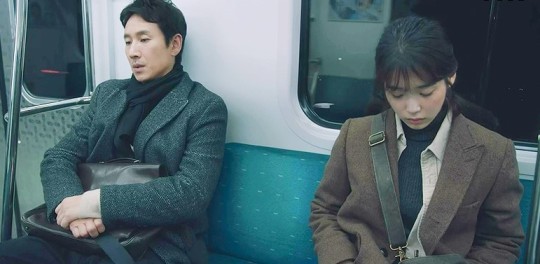
Lee Sun-kyun and Lee Ji-eun as Dong-hoon and Ji-an in tvN's 'My Mister'
There are several gems in Korean Dramas that depict the realities of life and growth, and ‘My Mister’ written by Park Hae-young is definitely one of them. Instead of pursuing the plot of another typical love story and corporate lifestyle, 'My Mister' tells the story of a man and woman, with over a twenty-year age gap, finding in each other their shared need for growth and healing in the frightful environment that society has become.
Without much skinship and hardly any heart-fluttering words of love and need, the show was able to intrigue its watchers and have them feel heartbroken and compassinate for the characters nonetheless.

Lee Ji-an portrayed by actress Lee Ji-eun
REALISM
Park Dong-hoon, a man in his 40s, is wrongfully accused of accepting a hefty bribe at work. Lee Ji-an, a temporary employee and subordinate in the same department, helps Dong-hoon with the case and asks for dinners in exchange for her deed. In the midst of external conflicts and other similar misfortunes which both Dong-hoon and Ji-an face, the two form an odd relationship that gives each other the ability to grow.
Feign ignorance. Keeping one informed may be a sign of friendship among kids your age, but adults don’t work that way. Feigning ignorance is a loyal and polite thing to do.
Park Dong-Hoon, episode 6 of 'My Mister'
Hae-young incorporates a lot of lessons garnered from the sensitive topics and conflicts of the world, which is what I’d consider scarcely found in K-Dramas, especially the ones centered around romance. Unlike what we usually encounter on TV, ‘My Ahjussi’ clearly depicts the troubles of poverty and failure without glossing over its truths.
It's easy for people who have money to become good people.
Lee Ji-an, episode 5 of 'My Mister'

Episode 7 of 'My Mister'
ACQUAINTANCES OR LOVERS
The show did not make me wish so much that Park Dong-hoon would reciprocate Ji-an’s likeness for him, but it doesn’t mean I was completely against the thought. I simply found the status of their relationship to be realistic and not lacking in any way that it needed to be more than what it already was.
Then why are you crying? – Because I’m happy. I’m happy that I’m close to someone like him. I’m happy.
A conversation between Ji-an and her grandmother
The happiness Ji-an feels alone to have had Dong-hoon in her life was enough for me. And was implied, enough for her as well. Ji-an’s feelings were inevitable, especially for someone of her age and someone who had experienced so little of the care she receives from Dong-hoon before.
I really lived my life for the first time ever because of you, Mister.
Lee Ji-an, episode 7 of 'My Mister'
Only in her early 20s, Ji-an is already the breadwinner of her small family and struggles with a drowning amount of debt and abuse. Yet despite her "damaged" background, Dong-hoon remains in her life. They both remain in each other's lives until they were both filled with the will to completely live.

The Park family on episode 8 of 'My Mister'
THE PARK BROTHERS
Screenwriter Park Hae-young was able to make every character that appeared on screen to be relevant and either admirable or loathsome. The Park brothers, Sang-hoon in particular, stole my heart and received all of my admiration and tears. Although neither are generally considered “successful” in the working field, Sang-hoon and Ki-hoon are able to make their misfortunes seem easy to tolerate--always finding a way to have a laugh at the right times and help whenever they could.
My life is already in ruins, so what's the point of crying?
Park Sang-hoon, eldest of the Park brothers
Resilience is often seen as idealistic or a display of maturity, but I usually view it as a pitiful thing to obtain. Because the chances that the most resilient people we know may carry the heaviest burdens are high. To witness such unfortunate people smile ear to ear is a painful but understandable encounter.
Rather than letting you escape from the living world and into a completely fictional one, ‘My Mister’ allows you to understand and prepare for life even further. If you’re seeking to go through sixteen episodes of a slow-burn type of love for the biggest tear-jerker on the final episode, then 'My Mister' is just the right choice for you.
(Click HERE for Writing Commissions)
#IU#Lee ji eun#lee ji-an#my mister#my ahjussi#park hae young#park dong hoon#tvN#tvn my mister#tvn drama#tvn show#kdram#kdrama review#lee sun kyun#netflix kdrama#나의 아저씨
134 notes
·
View notes
Text
Does being a sensor make a person more realistic even when they're feelers?
Yes.
Sensors are more pragmatic about the world than intuitives, who get lost in their ideas of how it "could be" rather than "how it actually is." Sensors start from a perspective of how the world works and move toward idealism; intuitives are more unrealistic about their dreams.
I was reading an article on how INFPs are portrait as the dreamers and more unrealistic of the types, but ISFPs can be pretty idealistic due to dominant Fi too.
It hasn't been my experience that ISFPs are also idealistic -- they are realistic about the outer world and tied to its realities in a way INFPs are not. INFPs struggle to understand how their online behavior can impact their real-world life, for example -- they forget the clause in their contract that forbids them to share controversial material on social media and get caught up in sharing controversial viewpoints, out of a desire to "change the world immediately," for example. Then they don't understand being censored or fired for breach of contract. This is idealism -- the belief that everything will turn out well, that the world can change without any upheaval, that what they forward or say is going to dramatically change someone's mind and life.
I could see how that's true because of our elevated ideals of conduct, but I was thinking of how usually thinkers are said to be the ones popping the NFP's balloons but that has been a pattern for me too. I think I have this weird mix of yes, having these high standards I hold people and myself to, but I also know very well that most people will never meet and and neither will the world, and that doesn't depress me or anger me. It's like I know many people are trash and we're all flawed, yet I can't help but be super disappointed and angry when individuals close to me (not systems or society at large) do morally or ethically reprehensible things, or are inconsiderate to me. Is that a dominant Fi thing?
Yes, I would say that's a Fi trait. Having high standards, not expecting others to adhere to your particular brand of morality, but also passing judgment on them when they let you down ethically.
I've always seen myself as matter of fact because of my Se, but now I see there's this other aspect that might explain why I'm this contradiction of accepting the world as it is without protesting or suffering about most things (it'll d no good), but expecting a lot from those I let into my circle. It's like yeah ok, the world is dirty and that's fine, but I don't want my air to get contaminated.
That is very Fi indeed. "I want to be left alone to do my own thing, and I don't want to judge you for how you chose to live, but I feel let down nonetheless by people's lack of ethics."
Are you also a 9w1? That would also play into this -- don't bother me or upset me with your bad behavior or lack of scruples.
33 notes
·
View notes
Text


Why does Rin try to save Shinji at the end of UBW, but spends most of HF thinking she shouldn't try saving Sakura?
If you've been in the FSN fandom long enough you've probably heard at least one variation of this claim—"Rin only receives character development in HF." "Rin gets sidelined in UBW in favour of Archer." "Rin got robbed in UBW." If one truly pays attention to the story however, one can clearly see just how utterly ridiculous and nonsensical all of these claims are. In fact—to say so isn't merely to betray just how little one understands UBW Rin, but also how little one understands HF Rin too. Because without UBW, Rin is nothing—HF is in constant dialogue with UBW. This applies to Rin as much as it does Shirou. HF is consistently begging us to compare how Rin behaves therein to how she behaves in UBW, because the contrast reveals much about the core traits of the character. HF Rin is nothing if not viewed in the context of UBW. To understand what precisely I mean here, we have to ask a question:
Why does Rin try to save Shinji at the end of UBW, but spends most of HF thinking she shouldn't try saving Sakura?
The answer to this lies in one of the best scenes in the whole of Fate/stay night—the scene featuring Rin's half-assed yet nonetheless sweet and touching confession to Shirou in HF; her remembrance of his trying to jump over that pole that it was oh so obvious he could not.

Forget the final confrontation with Sakura—this is where the essence of Rin's character in HF lies. Because this scene is all about why Rin acts the way she does toward Sakura, about what separates her from Shirou—and ultimately, what separates her from herself in UBW:
"…But even he knew it was impossible. He knew nothing would change that, but he kept trying. It's as if he believed the effort was what mattered."
"To be honest, I can't do such a thing. I've always been like that. I determine whether or not something is possible. If I know it's impossible for me, I quickly give up. I don't try what I can't do, and I never regret it or think I'm powerless because of it. I'm cold like that. I'm a terrible person. Kirei called it machine-like instead of cruel."
But Tohsaka isn't belittling herself. She's proud of how she is. "But I do sometimes think how pure it'd be to just keep trying without a thought for whether it's possible."
[...]
"In short, I can't do it. I can't protect Sakura until the very end like you, and I don't intend to either."
"———Tohsaka."
"I told you, right? I don't do impossible things. As long as I'm Tohsaka Rin, I'll kill Sakura the moment I determine that it's not possible to let her go on. Well, I don't need to say it again because that was our deal all along, but I thought I'd remind you."
The high jump scene has many purposes. One of them is to elucidate upon one of the core aspects of Rin's characterization—the cold pragmatic, calculating and thoroughly realist Tohsaka beyond the surface of which hides the warm, kind and idealistic Rin; who Rin believes she ought to be in the pursuit of her father's ideal, and the good moral heart that beats within her, threatening to burst out at any moment. It shows that Rin is simply too much of a realist to try and save Sakura like Shirou does when it appears basically impossible to do so—so she instead tries to kill that good-natured side of her. Nonetheless, we are left with the question:
Why does Rin try to save Shinji at the end of UBW?
As Gilgamesh himself points out to Shirou—it's pure hypocrisy! You can't save everyone. Rin's attempt to save Shinji from the Grail actively impedes upon their goal of destroying the supposedly omnipotent wish granting device and saving the world from Gilgamesh. From what we are told in HF (on the surface at least), Rin shouldn't be doing this—it's impossible. It's idealistic. It's naive. It's what Shirou would do.
It's what Shirou would do.
The boy whose youthful idealism and naïveté Rin found so inspiring.
The boy she wishes she could be like more—whether she is willing to admit it or not.
And that is the difference between Rin in UBW and Rin in HF—one enters a romantic relationship with Shirou, and the other does not. One develops a deep emotional bond with Shirou over the course of the story wherein his influence slowly and steadily forces her to accept that human side of herself that had always lurked beneath her, to embrace her idealism, to pursue Shirou's impossibly beautiful dream as relentlessly as he does; the other ends up at odds with him at too many key junctures of the story to develop the same intimate relationship, especially as Shirou starts to fall for someone else.
That is in essence the purpose of HF—to provide a counterpoint for Rin's arc in UBW, to show us the depths Rin will fall to when Shirou isn't there to encourage her to be the best she can be, to quit struggling against her human side, to abandon her attempts to kill her own emotions and to surrender herself to her desire to be as idealistic and hopeful as he. If UBW shows us Rin at her best, the purpose of HF is to then contrast that with Rin at her worst. Because at the end of the day, Rin serves as a relative straightman in a cast of deeply mentally disturbed characters. She serves as a foil to Shirou. The reason her route is also the Shirou route (as one Tiger Dojo puts it) is because Rin as a character does not need to be saved—nay, she is quite capable of saving herself. Rin doesn't need Shirou; but she sure is better off with him by her side. At the end of HF, Rin, despite not being as deeply under the influence of Shirou as in UBW, still chooses her human side over being the magus her father would've wanted her to be. Rin has issues... but those issues don't run as deeply as those of other characters. Shirou in particular. She may struggle more but she can do it. Nonetheless, Shirou's positive influence on her cannot be denied.
So—Rin clearly has an arc in UBW. How, precisely, does this arc unfold? How does UBW explore her character?
Up to about Shirou's defect, which per the anime would be somewhere around halfway through the route, UBW is a study in contrasts—the story presents with a carefully crafted waltz between Rin and Shirou which allows us to peel back the characters' layers. It starts with the prologue. Day 3 is of immense importance here since it emphasizes upon different aspects of Shirou's character than Day 3 of Fate does. Instead of focusing on Shirou's suicidal tendencies, the confrontation with Illya and Heracles focuses on Shirou's weakness and the fact that he isn't a proper mage. The focus is on how he freezes when Saber and Berserker start fighting. Why? Because he's being contrasted with Rin—a talented mage who retains her cool under pressure, being fully capable of keeping up with the fighting. Unlike in Fate (and HF), Archer's being uninjured means that Rin can actually participate—and the gulf between Shirou's abilities and hers couldn't possibly be more obvious.
Day 4 continues this with very clever use of side characters like Taiga, Sakura and Ayako (the latter of which is even responsible for the "Shirou never smiles" moment!)—they are used to emphasize just how normal Shirou's life is and how little he takes the HGW seriously, in contrast to Rin, who spends her day and night hunting after Caster. It cleverly continues the contrast between the double life Rin is shown leading in her prologue and the relatively uneventful, suburban Japanese life that Shirou leads, aside from his late night magic training. In fact... Archer himself points this out for us at the end of Day 5, as he escorts Shirou home:
"…Are you saying you don't smell blood on me?"
"Of course not. You're not fit to be a Master in that regard either. You are different from Rin."
"———What is that? Are you saying you can smell blood on Tohsaka?"
"Yes. She is rather kind-hearted, but she's merciless when she has to be. She wouldn't go around looking for other Masters every day if that wasn't the case."
"———"
She's looking for other Masters every day…? That means she's fighting other Masters. It's not like it's over once she finds a Master. Then———
Of course, that's minor in comparison of what else happens on Day 5.
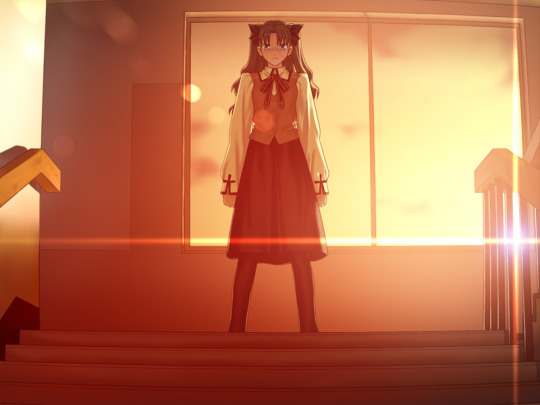
Stories are by nature defined by conflict. Conflict is the essence of storytelling. It's thus quite logical that Shirou has the worst relations with Rin at the start of her very own route than any other since it puts him in a position where he can discover the most about Rin. And Rin's decision to attack Shirou ends up revealing her inner conflict—the conflict between her commitment to being an unfeeling, machine-like magus, and her own personal feelings and desires, in this instance namely being her feelings toward Shirou. It is on Day 5 that Rin reveals the expectations that are placed on magi since their very birth:
"…What I got so angry about was how your dad never did anything against that. 'Magic' of a magus isn't just his magic. Magic is something passed down from parent to child for many generations. It's the 'sum of their life's work'. The responsibility isn't just yours."
"So the first condition for being taught magic is that you will pass it on to later generations. A child born into a magus's family instantly becomes a successor and an inheritor. ———We are born for that reason, and we also die for that reason."
"A magus' child isn't human from the start. No, it is the duty of the 'magus' to change what is born human into something else through many years and hard training. …That's why your dad isn't a magus. Your dad chose to be a parent over being a magus."
Of course, there's a bit more to this because Day 7 adds some more complexity to the matter here by having Shinji reveal to Rin that he is also a Master. And her reaction? She ignores him. She doesn't consider him a threat so much so that she decides not to attack him or even formulate any kind of plan for attacking him later. Seemingly this makes no sense. Why attack Shirou, but not Shinji? Because her decision to attack Shirou wasn't a pragmatic one. She attacked him because she feared that his participation in the HGW and her "objectivity" would be undermined. Rin is struggling desperately to maintain the perfect, strong, ruthless and emotionless magus facadé, and her feelings for Shirou are the greatest threat to it. She wants to remove him from the HGW so that he doesn't end up tempting her to succumb to her more human instincts. It goes to show how everything about Rin's claiming to be a ruthless, machine-like magus is just utter bullshit—Machiavellian magi wouldn't warn an opponent to take them seriously in a free for all to the death, like how Rin warns Shirou to do on Day 4; they would just kill them! Not to mention that we get to see Rin's "fail at the most important thing at the most important moment" complex again—despite how rational, intelligent and competent she has made herself out to be, and proved herself to be, she still ends up not realizing that Shinji is behind Bloodfort!
But that's only scratching the surface of what Day 7 does not only for Rin but for Shirou also—because Day 7 is represents a massive turning for Rin and Shirou's relationship, and for them as individual characters. It's the day when the hitherto carefully crafted dichotomy between Shirou the helpless novice and Rin the talented, highly competent novice... gets subverted.
Although the Bloodfort sequence certainly does not completely reverse the hitherto established dynamic between Rin and Shirou, it does severely undermine it. Because as Bloodfort is set up and the student body collapses, as the skin off of many of their peers starts to melt, Rin is deeply shaken and visibly disturbed, barely able to hide her trembling legs. And Shirou? Well... he's used to seeing dead bodies. Bloodfort is a brilliant sequence. It lays down the foundation for Rin and Shirou's relationship for the rest of the route because it forces for the very first time to truly face each other's issues. Faced with a horrific nightmare, both of them end up exposing a side of themselves they never otherwise would. Rin realizes that there is something deeply wrong with Shirou, and he gets to see just how much she is suppressing her human weaknesses and faults in order to maintain her strong and fearless talended mage facadé. The carefully crafted set-up has reached its pay-off as the characters start to find out ever more about one another.
Day 10 represents a massive turning point in UBW—it's where the route reaches the second of three junctures (the previous one being Bloodfort—which establishes that Shirou's issues are worse than Rin's, but still maintains an overall focus on her) that transition the story to fully committing itself to being the Shirou route. It does this establishing the core difference between Rin and Shirou in the beautiful and amazing scene called Shirou's defect—where Rin and Shirou discuss each other's lives in Shirou's courtyard. Heretofore the story had brilliantly weaven in parallels between the two—namely, that both of them are defined by the struggle of living up to the ideal they inherited from their father and their achieving their own personal happiness. Rin's being a mage is basically the same as Shirou's issues with his trying to become a seigi no mikata. Yet—Rin is a hedonist. As she says, she wouldn't do something if it wasn't fun. Rin may have inherited a duty from her father, but she wouldn't do it if she didn't find it fun. It establishes an important dynamic—Rin doesn't need Shirou to save her, she's perfectly capable of saving herself. That doesn't mean he is irrelevant however. Because Shirou may not actively and directly help Rin resolve her issues (for the most part), he certainly does do it indirectly, by serving as an example, inspiring her to be better, to be the best she can be. It's Archer's attacking Shirou, and her seeing his memories as dreams, that force her to confront her feelings for him, because she cannot help but be concerned for him and his well-being. Over the course of the route, she can't help but succumb to her human instincts. She starts relaxing around Shirou. With each new conversation she starts to let go of her commitment to the magus facadé. She starts to interact with Shirou less as a fellow participant in the HGW, and more and more as a person. Rin doesn't ask Shirou if he had and has fun being a mage because she has anything to gain strategically; she asks because she wants to get to know him. As a person. And get to know him she does...
But UBW's being the Shirou route does not preclude its analyzing Rin in-depth. Far from it! Because while it may not deal with Rin's issues directly, it certainly does so indirectly, through her reactions to Shirou's character arc, which itself ends up pushing her own arc further and ever further along.
First, there is her reaction to Shirou's losing Saber. Having spent a decade isolating herself from the rest of the world, Rin has become quite emotionally stunted. She isn't the best at properly expressing her emotions. So when Shirou ends up emotionally broken, Caster basically literally robbing him of his ideal in the form of Saber, and left helpless, Rin defaults to her cold uncaring magus persona and ends up rubbing the salt in his wound. Given that she fully intends on giving Saber back to him upon defeating Caster, the rational and sensible thing to do would be to act nice to Shirou, to be affectionate toward him. But as with her trying to attack him on Day 5, Rin is more concerned with looking like a cold pragmatic and ruthless magus rather than actually being one. She clearly has feelings for Shirou, and she is desperately trying to bury them by acting as cold and uncaring as possible toward him so that she can maintain her "objectivity" and not let her feelings distort her judgement. Of course—her feelings are distorting her judgement! In her attempts to present herself as the ruthless emotionless magus, she ends up revealing just the opposite! And it's even worse when you remember that Rin decides to this after she had decided to leave aside the HGW nonsense and just talk with Shirou like a regular human being.
Then... there's the confession scene.

This scene... represents the last juncture before the route finally transitions to being truly and indisputably about Shirou—without in the process losing focus on Rin. It represents one of the key moments of culmination in Rin's arc that predominately encapsulate the most important aspects of her character, offering a resolution to so much of her inner struggle, thereby allowing space for the rest of the route to comfortably deal with Shirou. And the resolution to Rin's issues... is Shirou.
It's important to remember that Shirou is not a naive character. Or a stupid character. Shirou's issues do not result from some wrongheaded ideological analysis—they result from his (near) complete lack of self-worth. And in the context of the story, Shirou discovering the pendant at Rin's mansion represents a major turning point for the character in that regard. Because by discovering the pendant, Shirou realizes that there was in fact someone out there who valued his life. Valued it enough to save it. And that someone just so happens to be the girl he has slowly been falling in love with over the course of the route. And seeing that Rin values his life... it makes him value his life. Without that Shirou's character development in the rest of the route simply cannot occur. It's important to establish that here.
There's also how Shirou's feelings on Rin relate to his feelings on the ideal. Because they do in fact parallel each other—Shirou starts out with a highly idealized view of both. Yet over the course of the events of the route he comes to slowly understand that his idealized vision was is fact quite wrong. There are in fact serious issues with his ideal and the way he goes about implementing it; just as Rin's is not the perfect honour student he had envisioned her to be. And yet... Shirou still reasserts his faith in both by the end. Yes his ideal is unachievable, but the pursuit of it is still beautiful; Rin wasn't as strong-willed and secure as she had initially appeared, but all those weaknesses end up making her stronger and better in his eyes because she nonetheless succeeds despite their holding her back. Rin can never truly live up to that perfectionist standard she has set for herself, but her valiant effort at constantly struggling to nonetheless to reach it is nonetheless amazing; nay it makes her even more amazing than if she had actually succeeded. In both cases, Shirou is forced to confront the ugly in something he found beautiful—only to come out the other way thinking they are even more beautiful.
Then there's of course Shirou basically spelling out many of the themes of the route:
"That's just now, right? It's irritating, but I agree with Archer. There's nothing for you to regret." "Why? Caster is doing whatever she wants, and even Archer lost faith in me. This is because my policy was a mistake, right?"
"It's just that you were unsuccessful. You haven't made a mistake. If you haven't made a mistake, you can be proud of yourself even if you were unsuccessful."
———The process. If you walk down the path that you believe is right, you cannot be wrong. …At a time like this, most people will realize that their path is a wrong one, but she's different. Her path should always be one that she can be proud of.
"———Yeah. To be honest, you've always shined. …I won't regret my actions either. I believe what I've done is right, but it's full of stitches."
———I don't want to regret anything. I want to make all the tragedies that happened into meaningful things by believing that my path is right.
Of course... we have to talk about Rin here. We've covered Shirou's point of view so it's important to talk about the significance this scene has for Rin, though it's incredibly difficult to disentangle Shirou's arc from Rin's, since they are so deeply intertwined. Shirou encouraging Rin to get back on her feet, his seeing through her facade of strength when Archer betrays her... it says just about as much about him as it does her.

We already established that Rin is not good with expressing her emotions. We already established she does not have the most healthy outlook on life, with her perfectionism resulting in her bottling up all her doubts and insecurities, and desperately trying to bury her weaknesses. She has no-one to show her vulnerabilities to.
Until Shirou. He gets her to relax. His unbridled idealism wins Rin over. He's the only person who could possibly breach through all of her barriers and earnestly converse with the fragile yet still very strong girl hiding underneath, a girl who doesn't need to be afraid of her weaknesses because she's strong because of them. Instead of burying all her emotions she can just be honest about them—to Shirou, the boy who loves her and whom she loves back. Rin still has a long way to go after this moment. Yet nonetheless... it's a breakthrough. For the first time in maybe a decade... Rin has chosen to drop that strong magus facade and to show her real self. And it's beautiful.
Next up is Your distortion—my favourite scene in the whole VN.
Suffice it to say... this scene is all about Shirou realizing that all along he had pursued Kiritsugu's ideal because it made him happy—just like Rin did being a magus. And all thanks... to Rin. To seeing her cry for his sake. Begging him to care of himself. It's Shirou taking the next step from his confession—and learning the error of his ways:
"I'm telling you that's crazy! Look, if you were saved, take care of yourself! I'm sorry for the people who got killed, but it's only by chance that you were saved! Then you should take full advantage of your good fortune. You suffered such a hell, so it'll be a waste if you don't have fun!"
Tohsaka is seriously angry. "——————" Yeah, that makes me happy. I finally realize now, because Tohsaka is that kind of person.
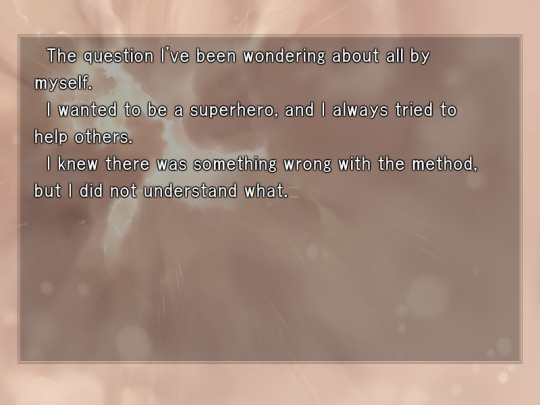
———But it's so clear now. It's because of this person that is seriously angry for my sake.
But what precisely are the implications here—for Rin specifically?
Well on one hand it's just extremely touching to see this deeply emotionally repressed girl be so heartbroken at seeing just how deeply disturbed and distorted the person she's come to love is that she can barely contain the flood of emotion that she feels. Yet it is also noteworthy how she reacts when Shirou tells her that despite the fact that she is right, he nonetheless still believes that there's something beautiful in devoting your life to saving people. She blushes. She gets flustered. Although she tries to act cool afterwards, it is quite apparent she found Shirou's words touching. She obviously agrees with him. But perhaps she's just not that ready to admit that yet.
She will be soon however because Day 14 has her choosing to accept Shirou's ideal. By taking on Saber to be her Servant.
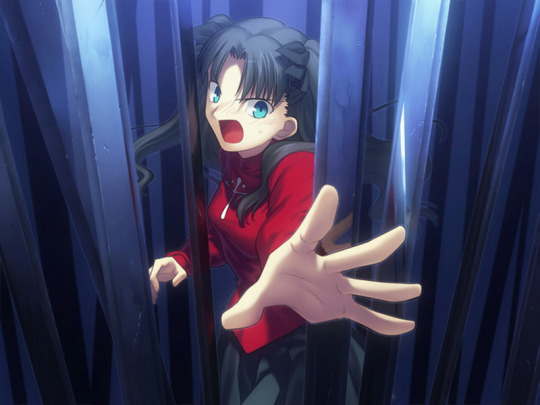
Saber is in essence supposed to be the personification of Shirou's ideal—the fact that Shirou loses his contract with her at the junctures in UBW and HF that he does is no coincidence. Both occur at (or before) points where Shirou's belief in his ideal is deeply shaken. Rin choosing forge a contract with Rin which actually makes Saber stronger than she was under Shirou at a point where she realizes that the confrontation between Archer and Shirou is drawing closer and in fact that the former could in fact kill the latter if she does nothing... it's deliberate. Especially since she this to Archer after he kidnaps her:


Although Rin didn't want to admit it up until, she in fact loves Shirou for the very traits that she has been criticizing him for up until now. The dynamic that defines Shirou's view of Rin is also the one that defines Rin's view of Shirou; just as Shirou is forced to confront Rin's warts only to declare that he loves her even more for them, so too is Rin forced to confront that the very perseverance and refusal to budge in the face of the impossible that had drawn her to Shirou all those years ago could take a toxic form when combined with his lack of self-worth and survivor's guilt. And yet... she still adores him for it. She still can't help but be moved by it. As Kirei says as he nearly rips her heart out:
"You're right. You never give up until the very last second, Rin. At the very same time, you have this wonderful side of you that admits reality. ———Yes. This contradiction is very mellow."
This fundamental inner conflict within Rin is essentially resolved here, with Rin choosing her human idealistic sides that never gives up until the very last second over her cynical and pragmatic magus streak. She gives Shirou her mana with which he is able to use Unlimited Blade Works—an allegory for how her love and support ends up allowing Shirou to make his dream a reality.
And so... we return to the question that started all of this.
Why does Rin try to save Shinji at the end of UBW?
Simple.
It's what Shirou would do.
Rin loves Shirou. He brings out that side of her that her magus upbringing compels her to bury and kill that still manages to make its way back to the surface—because she can't help but feel drawn to Shirou and feel inspired by his example.
It's what Shirou would do.
UBW isn't like Fate and HF. It's not about Shirou saving a heroine (though, if I were fully honest, I would not say that Fate and HF are truly comparable). It's about a heroine saving Shirou. It's about Rin saving Shirou. Rin doesn't get saved by anyone.
But that's okay.
Because saving Shirou? That's Rin's salvation.
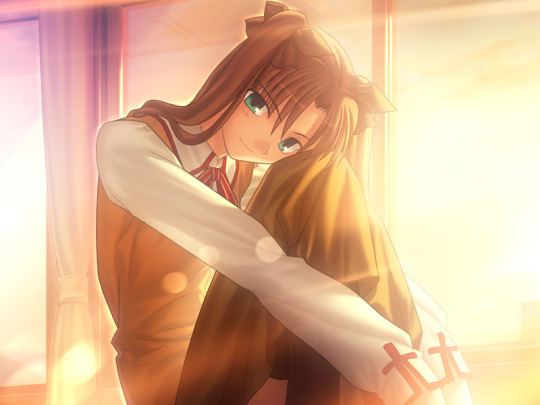
#unlimited blade works#fate stay night#fate stay ubw#rin tohsaka#shirou emiya#tohsakarin#emiya shirou#shirin#fsn#fsn ubw#they are my precious babies#i love them so much
25 notes
·
View notes
Text
[♡] #6 TETSOFTIE !
washijo's class, monday around 8:00-9:00am, kuroo and yn's second interaction—but she doesn't know that.
you’ve been trying to get as many points in as possible before the timer runs out since it was both a spontaneous and fast paced presentation. as you’re nearing your closing argument a hand sticks up in the air, prompting you to stop midsentence. eyes flick to mr. washijo in confusion, then to your group of friends who simply shrug, just as clueless as you. the professor raises an eyebrow, side eyeing the tall student clad in a black hoodie, lazily slouched against the chair with his limbs hastily thrown in front of him.
“what is it, kuroo? haven’t you finished your presentation?”
you anxiously glance at your watch as the student, kuroo apparently, takes his leisurely time heaving himself off the chair. you can’t help but notice how two other students are exchanging looks and throwing glares at him, both with a head of blond hair. the first one with a shade of brown peeking at the roots with his shoulder length hair messily thrown in a bun, the other with a neater, shorter style and an undercut.
“mr. washijo, i just can’t help but notice how miss…?” he trails off. you curtly utter your name with a frown, clutching your notes tighter in your hands. “right, i can’t help but question the feasibility of her proposal, y’know in case we actually proceed with this for our final.”
“i beg to disagree,” you huff, cutting off both kuroo and the professor. mr. washijo throws you a look through the thick rimmed glasses barely sitting on the bridge of his nose but he nods slightly for you to continue, nonetheless.
kuroo crosses his arms in front of his chest, biting his lip to stop him from replying with, “then beg.”
“all things considered, i think it’s a promising plan. the points i haven’t covered in this very brief presentation will be dealt with as the semester progresses.”
he leans on an armchair, an amused expression on his face. you could make out disapproving looks from his two friends, scolding him in a hushed voice, but kuroo dismisses them. “that’s the problem, you presented all the 'too good to be true' opportunities, yet you fail to acknowledge the evident threats—”
“well i am a business student, kuroo,” you hiss, narrowing your eyes as the unfamiliar name rolls off your tongue. “the goal is to try and make an endeavor as successful as possible—”
“ah, i see. you’re an idealist,” he says almost mockingly, briefly turning to your professor. “i think it’s pretty important for us in this course to be realists, no?”
mr. washijo sighs warily, glancing at his watch unimpressed. “time’s up.”
“but sir—”
“kuroo, i can tell this is your pathetic attempt at gaining extra points—”
“at my expense,” you mutter quietly.
“—but i did say you have to defend your proposal should your classmates have any questions, and kuroo made some valid points. each individual is like an entity, competitors if you will, in a saturated market. it’s only right for all of you to act as such. anyway, you passed so you may take your seat.”
“does that mean i did, too? you said it yourself, sir i made some valid points. with an s,” kuroo giggles, the giddiness in his tone unmistaken as he wiggles his eyebrows.
“take a seat,” mr. washijo firmly replies.

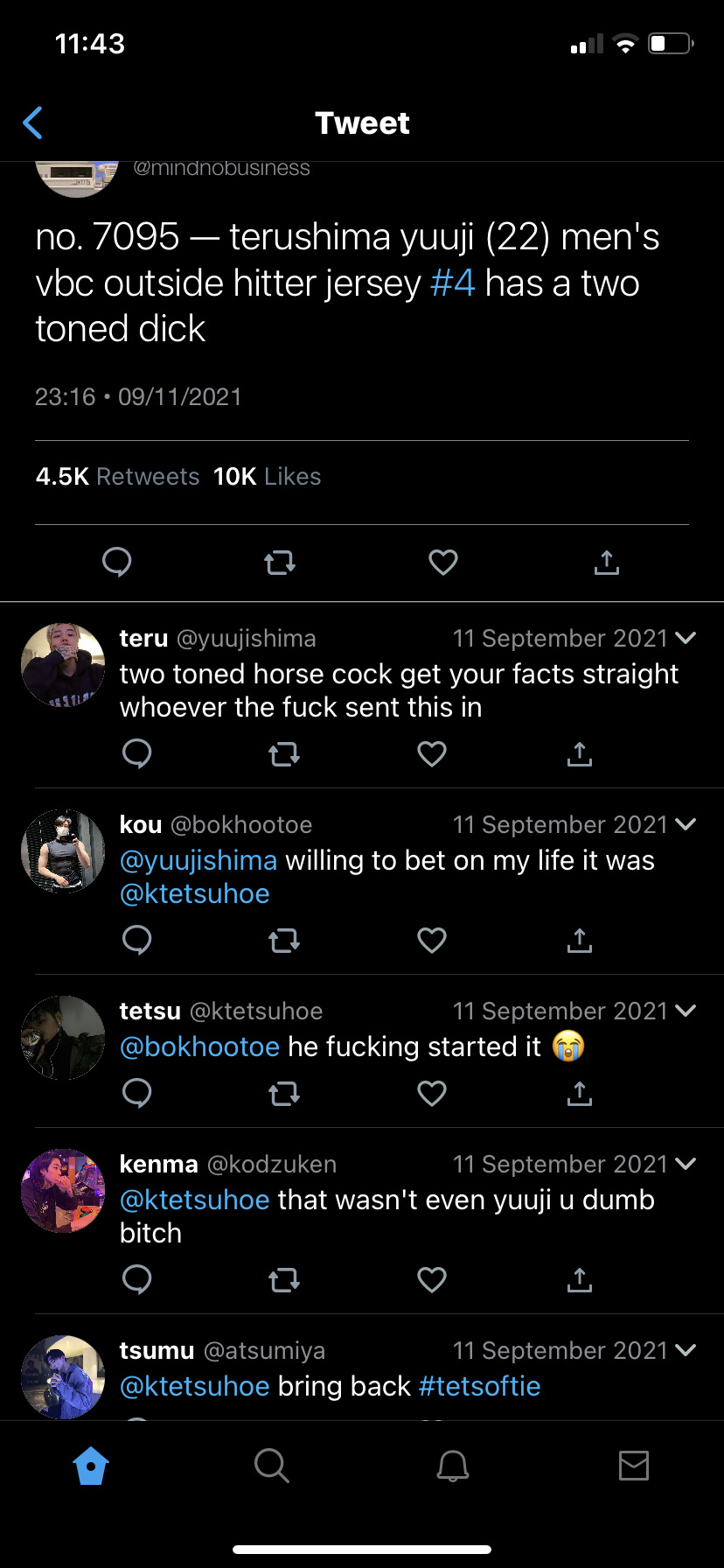

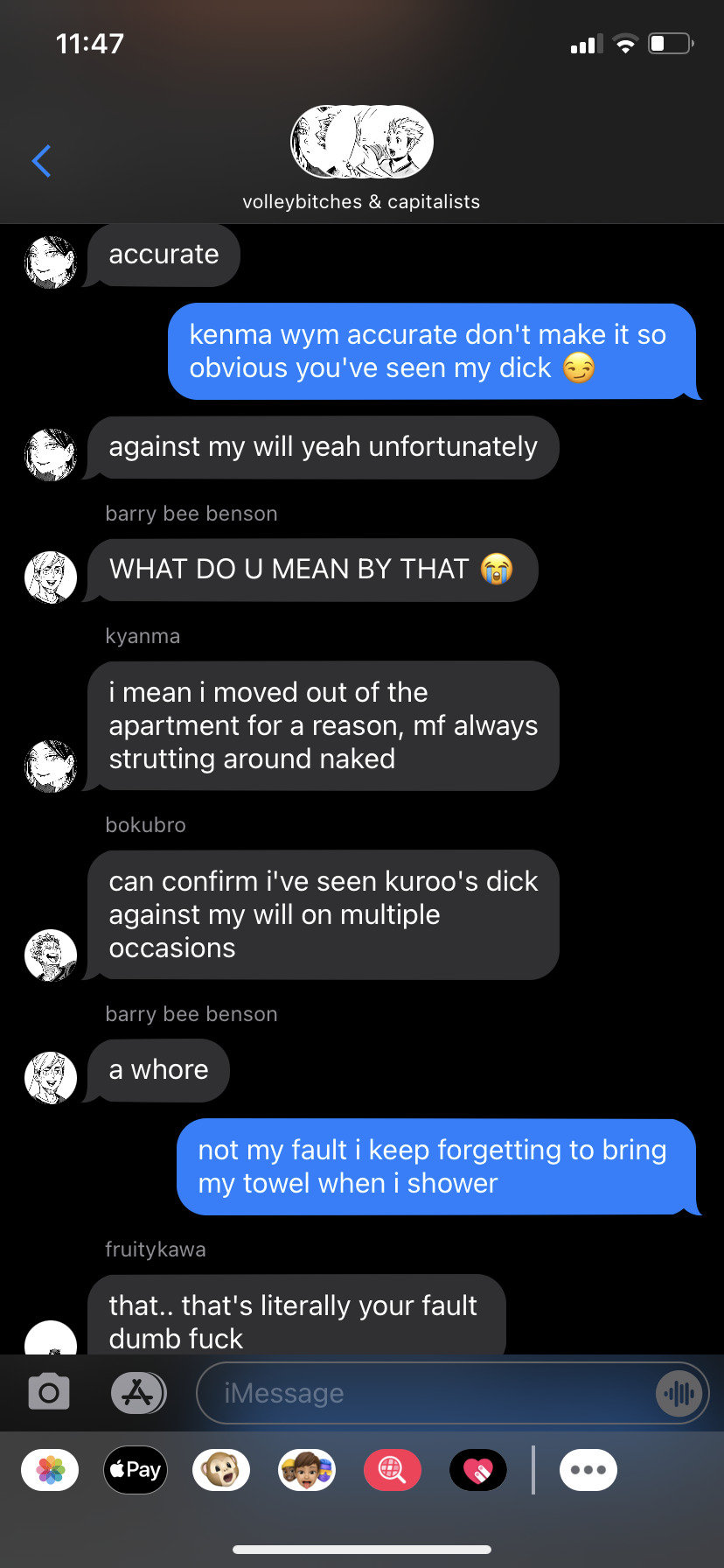


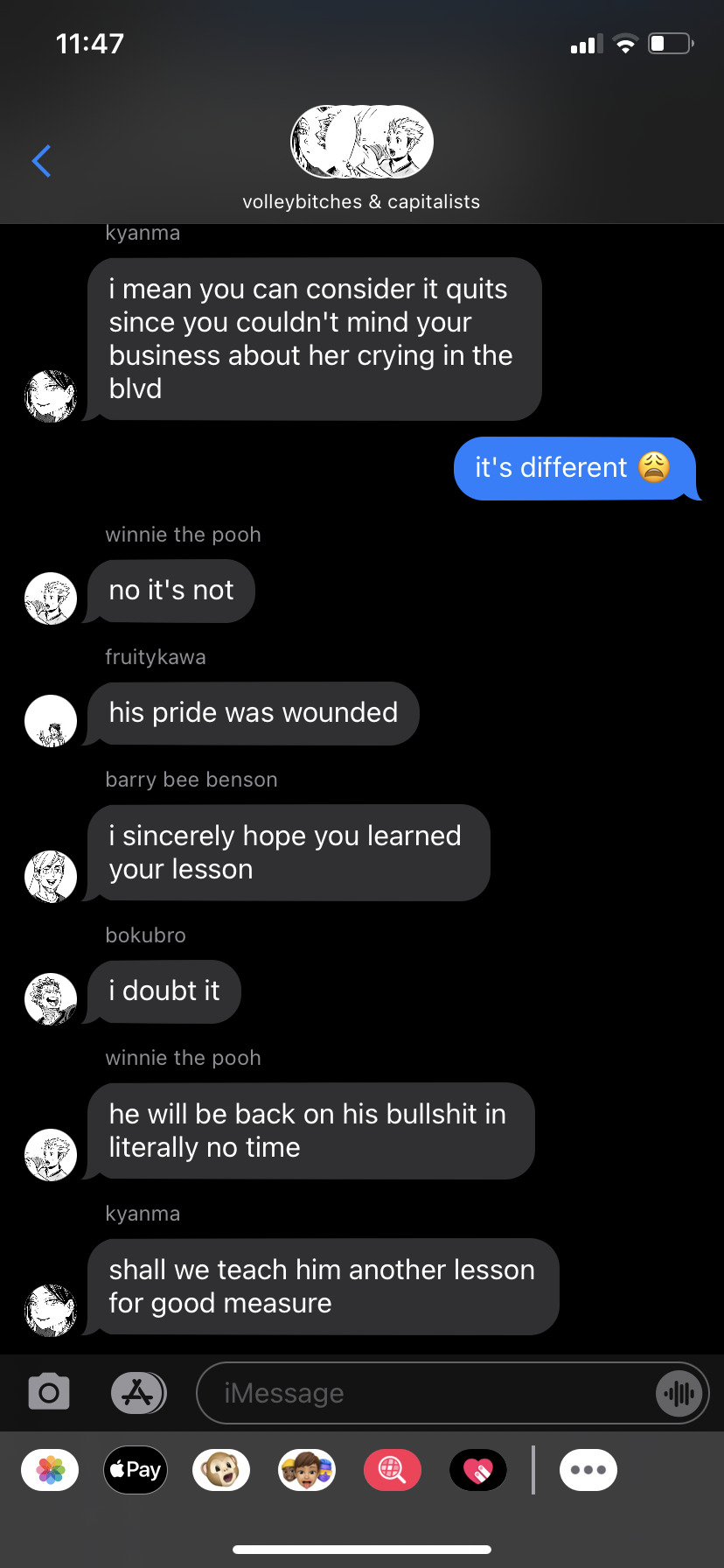
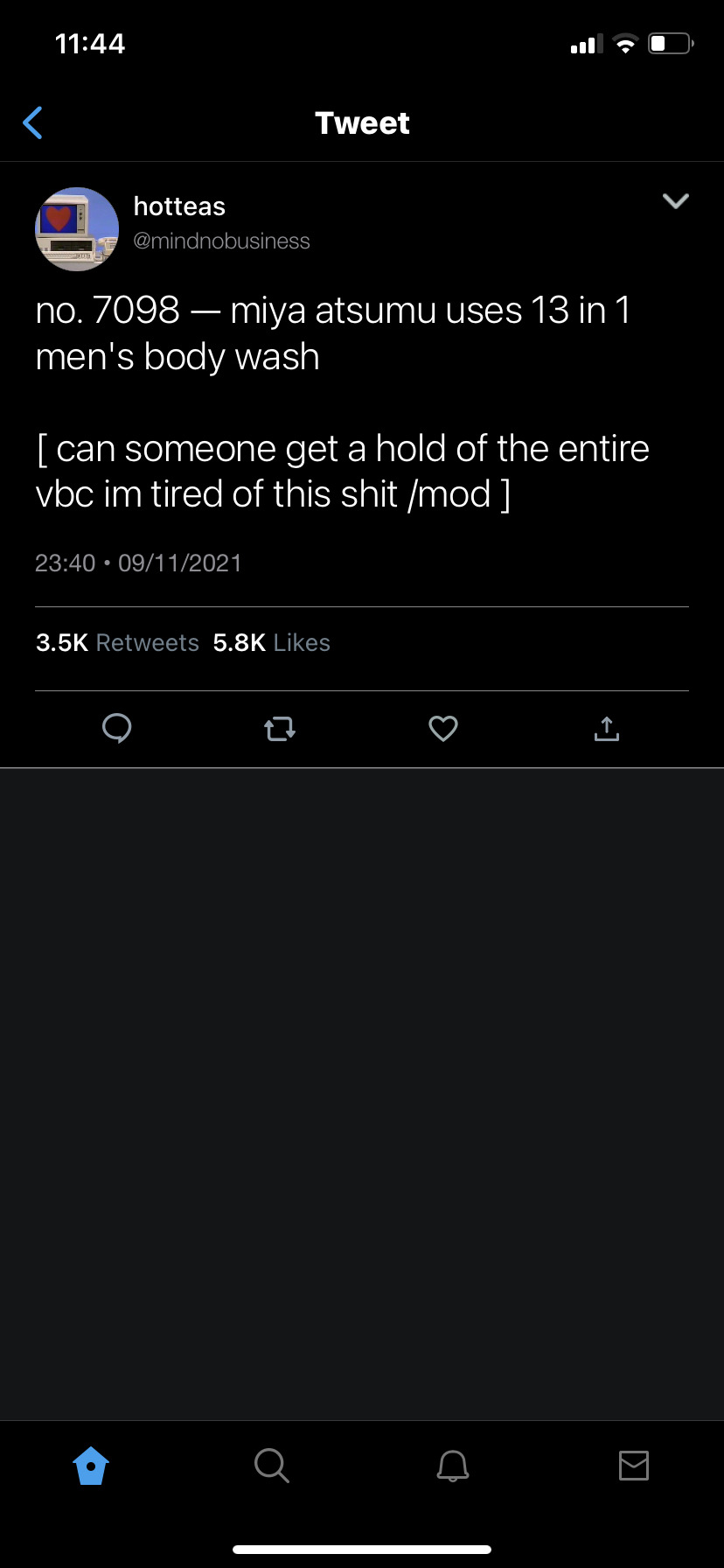

MASTERLIST | PREV | NEXT
[♡] DIRECTOR’S CUT !
— note that the written portion takes place right before chapter 4 and 5! sorry for the confusion.
— bokuto moved in with kuroo after kenma moved out, he needed more space for streaming and quite frankly, he couldn't stand kuroo anymore.
— kuroo sent in both entries about terushima and atsumu, but nothing comes close to tetsoftie as of the moment. rip.
#—out of spite; gwen#haikyuu x reader#haikyuu smau#haikyuu angst#haikyuu fluff#haikyuu smut#kuroo x reader#kuroo smau#kuroo angst#kuroo fluff#kuroo smut#kuroo tetsuro x reader#kuroo tetsuro smau#kuroo tetsuro angst#kuroo tetsuro fluff#kuroo tetsuro smut#hq x reader#hq smau#hq angst#hq fluff#hq smut#[ 🍰 : funfetti ]
182 notes
·
View notes
Note
I'm sorry to tell you but I would love to hear about the historical inaccuracies and all of your qualms with the pirate au with naval captain techno and this is your blog on a site you presumably come onto to enjoy yourself so you genuinely should have to worry about offending people with your thoughts and opinions so long as you're respectful and acknowledge their efforts before listing what was done wrong so they can learn :// /gen
WAH ok ok. uh. this is not gonna be a super serious rant bc i dont have any actual issues w the fic and its very well-written and if u like shit like potc or whatever u should definitely read it bc its very fun. that being said thats also MY special interest theyre butchering so im just gonna like. infodump about golden age of piracy below the cut
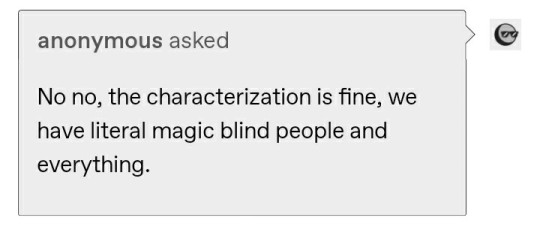
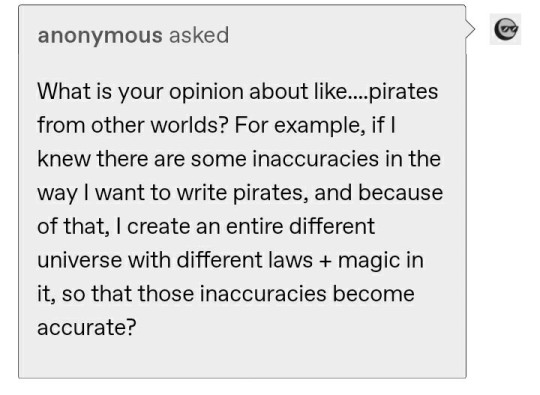
gonna start this off rq by saying im ignoring any obviously fantastical elements like erets magic or the weird storm at the beginning cause like. idrc about adding in fantasy shit, my own pirate au has like. piglins and shit. its fine idc
ok first major point is like. general characterization. which i dont honestly think is the fault of the writer misunderstanding the characters or anything, i think its more just the general assumption that pirates were all lawless renegades and the navy were idealistic men or something, in which case, lil bastard shit philza would fit the pirate role better while deeply ideological techno would fit the navy. but. i find it really fucking hard to believe that a character whos anarchist ideals make up a big portion of his motivations would be a bootlicker. and he honestly fits pretty well into the role of pirate captain? a big part of like. piracy in general. was creating this terrifying image of yourself, bc realistically you didnt want to get in a fight with every ship, that costs ammo and ship repairs and possibly lives. and i think technoblade, someone who is usually known as The Blade and who has a reputation for just being. super fucking bloodthirsty. but in reality has deepseated ideals and is determined to protect his friends at all costs, would fit way better into the role of pirate captain than phils casual war criminal self would (to be clear: i aint saying phil wouldnt be a pirate, he absolutely would. im just saying hed be a kinda shit captain tbh)
second point: pirate crews did not have the same highly hierarchical approach to roles on a ship as the navy did. to the writers credit, they kinda touched on this in ch 3 when they mentioned that the mens loyalty would still lie w phil rather than techno, but like. pirate captains werent just put into place like that, and certainly not by the previous captain. they were generally elected by the crew, who could then elect someone else if they didnt live up to their standards. also, when someone joined the crew, there'd be this whole captains code thing that theyd have to read and sign (admittedly, i know why they didnt put that part in, paperwork is boring im not faulting them for that)
along the same lines as the hierarchical shit, there wasnt really a first mate, at least in terms of like. "second in command." what there Was was a quartermaster, someone who kinda like. relayed messages between the crew and captain. again, not a huge grievance, just something that kept bugging me every time they mentioned it
another rather small grievance but one that bugged me nonetheless: at the end of ch 3, they had this moment where techno looked up at their colors and had a minute of Self Reflection that i completely ignored bc like. you would absolutely not just sail around w the black raised you are a sitting fucking target and it gives any navy vessel/pirate hunters just like. a dead giveaway that you should be attacked. youd only raise the colors if you were like. actively chasing a prize
ALSO while we're at it. this ones not a historical inaccuracy but is more of just a missed opportunity. not everyone had the same flag! most pirate captains had their own unique designs, some a bit more. goofy. than others


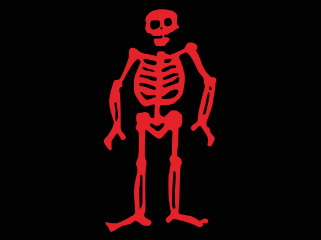

in phil and my au, techno has a flag similar to calico jacks (top right), but with a pig skull instead of a humans. again, its not entirely historically inaccurate, but it wouldve been cool to see what their ideas were for a unique philza flag
ok my last major issue here and one i wanted to save for last bc its a bit more graphic than others: corporal punishment (pogchamp!). im gonna be honest, im not super familiar w what could and couldnt get you punished w the royal navy, But what i do know is that the whole. cutting off a hand thing. would not be super accurate. if he was punished, hed likely be whipped (probably w a cat o nines which are like. super fucking brutal. not a fun time in the slightest). amputations were more of a "whoops you got an infection and this is the 18th century so our treatment is just to Chop" thing
#tw torture#negativity#? i dont wanna be rude i just like pirates man#ask to tag#oh and like. this isnt a 'they should know/research this stuff' its a fucking minceraft fanfic i know theyre not gonna research its fine#i just wanna rant
130 notes
·
View notes
Note
Yandere america (+ russia?) x (fem) country reader. Who he Colonized her. And she wants now be Independently
I’ll take it that Russia is not a yandere in this post – it simply makes things more interesting. To not extend this into infinity, I’ll mostly focus on Russia’s side of the whole drama. I just so happen to have a lot of ideas on this because I once wrote a story with a similar dynamic with a former friend.
Yandere Hetalia
Yandere! America vs Russia

Alfred wouldn’t be one of those yanderes that would completely isolate their victim and shut them away so that you would never see the light of day. Since you’re also a colony, that would mean you’d have to make regular public appearances. He would see it as a chance to flaunt you off to everybody, have made spiff so that you’d be good arm candy. It would probably be during an post-meeting party that Ivan would first meet you.
Ever so gently, he brushed his lips against your knuckles and stared into your eyes. The sweet smile could only do so much to mask how jaded you were.
“A pleasure to meet you, (l/n)”, he smoothly said. Dimples formed around your mouth as you countered with brevity: “Charmed.”
Ivan had long ago learned that people spoke more with their bodies than with their tongues. You were no different. It was evident that you didn’t want to be here – you didn’t sway to the jazz that was coming from strategically positioned loudspeakers, nor were you indulging so merrily in the alcohol that was flowing in rivers tonight. Some of the other personifications were well on their way to getting properly smashed.
You on the other hand, stood there with hunched shoulders and a hand buried in the silk of your skirts.
The next logical step was to identify the cause of your discomfort – you had just aroused his curiosity in that way.
“Alfred told me a lot about you, but he failed to describe the true magnitude of your beauty”, Ivan remarked lightly as he released your hand. The way your muscles tensed even further gave him the concrete answer to many of his question.
The dynamic of an empire and a colony would be all too familiar to Russia, so much so that he wouldn't spill tears for your sake. It is simply how the world works and Ivan had learned to believe in the wickedness in people. Sure, your relationship with Alfred wouldn't match in violence as America’s had with England, or Mexico’s with Spain, but it would nonetheless be of the oppressive sort. Ivan would soon hear from his spies reports on your maltreatment – of how Alfred had quasi forced you into a pseudo-marriage, of how he was draining you dry and forcing you to assimilate his culture and way.
He’d have dregs of pity so if you’d go to him for help he would gladly do so. Ivan would see the benefit of baiting America into doing something rash and additionally flipping the bird at him.
He’d accommodate for you as long as you’d respect him. Should you not do so, then he’d be a bit lenient before totally kicking you out. Respect is the foundation for all good and healthy human interactions and if you wouldn’t comprehend that, then he wouldn’t shy way from showing you the repercussions.
You should have known better than to constantly disregard is advice, not heed his warnings and ignore his explanations as to why he was doing certain thing. Now you had run yourself aground and Ivan wasn’t keen on granting you a fourth chance. He was all snarls and fury.
“No, you're so proud of being a victim, so enamoured with your own suffering that all that occurred to you was that I view you as property. You just have to have a villain in your life. “
He was now standing in front of you, and you were trembling. Eyes as cold as ice and lips twisted into a snarl - he wasn't to be trifled with now
“My compassion and care are wasted on you. Leave.
“Leave and don't dare to ask me for help again. You could have just asked, said you wanted to go to another country. I would have even understood it. But your actions have led to this.“
He turned around, looking over his shoulder.
“I wish you the best of luck, scraping together enough money to survive for a few days in a place you don't know with a language you don't speak. Now get out of my sight!“, he barked and then walked away.
On the flip side, such things wouldn’t come close to happening if you are polite and treat him with human decency then he’ll be more than glad to help you. He would help you set up an army, establish treaties, build infrastructure. You might even grow to like him – Ivan isn’t such a wide-eyed idealist as Alfred is, rather being cynically realistic, and also contemplative.
“You know, the whole matter is a bit ironic”, he remarked lazily one day. You were both sitting at your desk in your makeshift office – you stooped over documents, all logistics, and he had idled his time away with a book since he had already finished his part.
At least he hadn’t thrown up his feet on the table this time.
Tiredly, you looked up from another document entailing rations to stare at him. Violet-blue eyes were already trained on you, and there was that peculiar smile on his lips that was somewhere between sarcastic and amused.
“And what would that be?”, you asked with slight interest. Tension was hanging in the air; it was had in the past few weeks and it would be the same in the future ones. Alfred simply had that effect when he was angry. As a result, you were drained, with only minimal capacity to show interest.
His mind swept off again and he voiced some of his spontaneous thoughts aloud: “You’ve started talking more and also more freely.”
Indeed, you had. Being away from Alfred had given you the opportunity to breath more freely and it was showing.
“That wasn’t what you were referring too. So please, lets get back on track”, you pointed out. Your benefiter tended to switch topics frequently in a conversation and you didn’t have much of the headspace to deal with such convolutions now. You actually only wanted to be in bed at this late hour and following Ivan’s trains of thought could be like stumbling around a labyrinth.
Russia was strange on his own. Probably something about being stuck in the middle – between Western individuality and Eastern collectivism, between Southern hot-bloodedness and Northern stoicism. He took the fact about himself lightly and left you to cope with it.
“What I was referring too,” he elaborated, “was how Amerika was once in your position. So keen on squirming out of the control of England and so determined to dictate his own life. I gave him the one or the other helping hand all those centuries ago and now I’m here doing the say for you. History does have an odd way of rhyming.”
It made you halt in your thoughts, because he was right. Your current situation was so similar to what you knew of America’s teenage rebellion. He pulled and you pushed in opposition. He wouldn’t let go and firmly asserted that you belonged to him, that your rightful place was either at his side or at his feet. Alfred had even been as insistent enough as to repeatedly call you multiple times a day and try to harass you into coming back at him.
Like father, like son, really. Arthur had also held a vindictive, sickening obsession for his eldest back in the 18th century.
A few of those times Ivan had snitched your phone to have a few choice words with your soon-to-be ex. That was before calls had been regulated and locations scrambled, and numbers suppressed.
You had gone out of your way to remember those choice insults that were often yelled into the receiver shortly before Ivan had hung up.
Russia really was right.
89 notes
·
View notes
Text
Caravaggio’s “The Cardsharps” and “The Fortune Teller”
[abridged excerpt from Keith Christiansen, A Caravaggio Rediscovered: The Lute Player (The Metropolitan Museum of Art, 1990)]
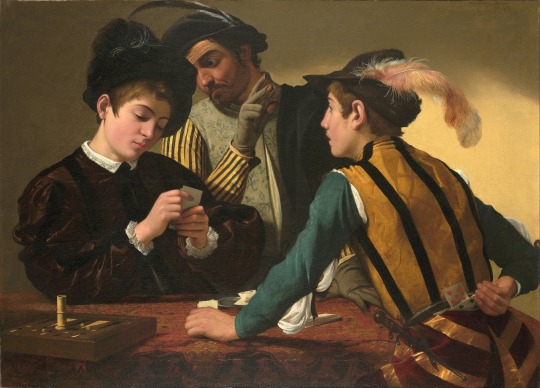
Fig. 1. Caravaggio, The Cardsharps (c. 1594). Kimbell Art Museum, Fort Worth, Texas
Caravaggio (1571—1610) had arrived in Rome from his native Lombardy sometime after May 1592, unknown and without a single major picture to his credit. One rumor had it that he fled Milan following an altercation, but he may simply have been seeking a larger arena for his untried but considerable ambition. His first two years in the city were miserable. For a time he was reduced to painting copies of devotional pictures for a beneficiary of Saint Peter’s (a task for which few artists can have been more ill-suited). His attempts to set up shop with other young artists ended in failure, until the most ambitious of his early pictures—The Cardsharps—was purchased by Cardinal del Monte. The cardinal seems to have been greatly impressed with the work, for there followed an invitation to take up quarters in his residence and the promise of a stipend. The event marked a turning point. The years spent with Del Monte, from roughly 1595 to 1600, were crucial to Caravaggio’s career and his development as an artist.
More than thirty copies of The Cardsharps are known. The critic Bellori, who was not an admirer of Caravaggio—he championed an idealist conception of art at odds with the realistic premise of Caravaggio’s work—describes it thus:
“[Caravaggio] showed a simple boy with cards in his hand, his head copied from life very well, wearing dark clothes, and opposite him a fraudulent youth in profile who with one hand leans on the game table and with the other takes a trick card from his belt, while a third [figure] near the boy observes the markings of the cards and with three fingers signals his companion, who, in leaning over the table displays to the light his yellow jacket with black stripes; nor is the color untrue to life.”
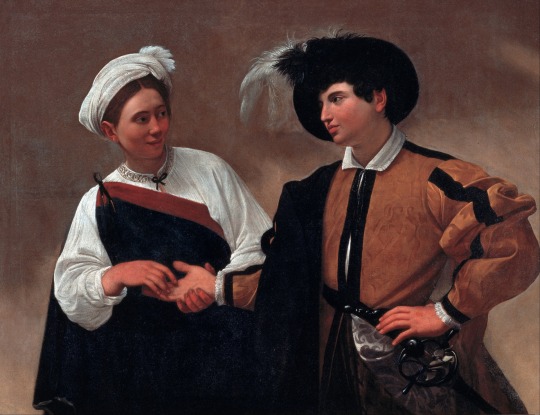
Fig. 2. Caravaggio, The Fortune Teller (c. 1594). Pinacoteca Capitolina, Rome.
When Del Monte purchased The Cardsharps and The Fortune Teller, their subjects were as novel as their style. So far from being simple demonstrations of mimesis—paintings as tranches de vie—they employed recognizable types and familiar situations to make a quasi-didactic, moralizing point about deception and the credulity of youth. This intent linked them to a category of painting that Cardinal Gabriele Paleotti had termed pitture ridicole in his 1582 discourse on painting: pictures that instruct by ridiculing foolish behavior. However, the works Paleotti probably had in mind relied, for the most part, on an extensive use of emblems and parody. Caravaggio’s approach, at once disarmingly direct and richly allusive, was a radical departure, brought out in a 1603 madrigal on The Fortune Teller by Gaspare Murtola :
I don’t know which is the greater sorceress: the woman who dissembles, or you, who painted her. She with her sweet spells ravishes our hearts and blood. You have painted her so that she seems alive; so that, living and breathing, others believe her.
The ability to convey meaning by seducing the viewer into accepting a picture as the equivalent of a real experience rather than as an abstracted statement lies at the heart of Caravaggio’s art, and it placed him at odds with the art establishment of his day. Nonetheless, even a later, classically biased critic like Bellori realized that this novel approach required not only technical mastery but also a command of costumes and the ability to describe human character.
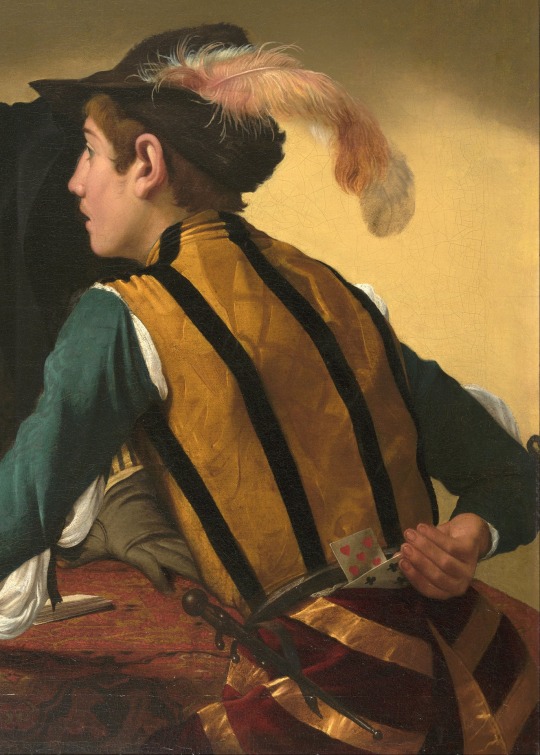
Fig. 3. Caravaggio, The Cardsharps (detail).
In The Cardsharps the wily figure to the right (fig. 3) is identified as a soldier of fortune, or bravo, by the clothes he wears. These closely match the illustrated description (fig. 4) in Cesare Vecellio’s manual of costumes (Venice, 1590), where it is stated that “these bravi or sbricchi… wear on their heads high hats of velvet or silk… with a jacket of Flemish cloth and stitched sleeves…. They frequently vary their dress, and are always dueling…. They serve this or that [master] for money, swearing and bullying without provocation, and committing all kind of scandals and murders.” In Caravaggio’s picture the bravo sports a parrying dagger (pugnale), which he wears on his left rather than his right hip, since he carries no sword.
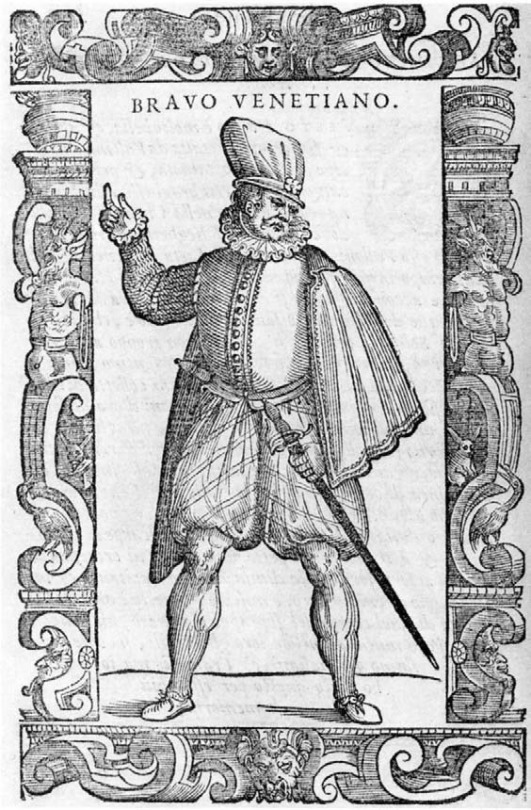
Fig. 4. A soldier of fortune (bravo venetiano), from Cesare Vecellio, De gli habiti antichi, et moderni (Venice, 1590).
Caravaggio, who enjoyed the role of the street brawler himself, must have been familiar with these youths. In his 1565 compendium of gambling practices, Giovanni Cardaro warned against gambling with such types, noting that they always won “because of their greater experience, trickery, and skill.”

Fig. 5. Caravaggio, The Cardsharps (detail).
In contrast to the brash clothes of this streetwise young sharp is the velvet finery of his victim, an empty-headed pretty boy (fig. 5). The cunning accomplice wears torn gloves and mismatched vest and sleeves that define his social status as effectively as does his comical face, with its exaggerated, almost masklike expression (among Caravaggio’s earliest and not altogether successful attempts to depict a fleeting emotion).
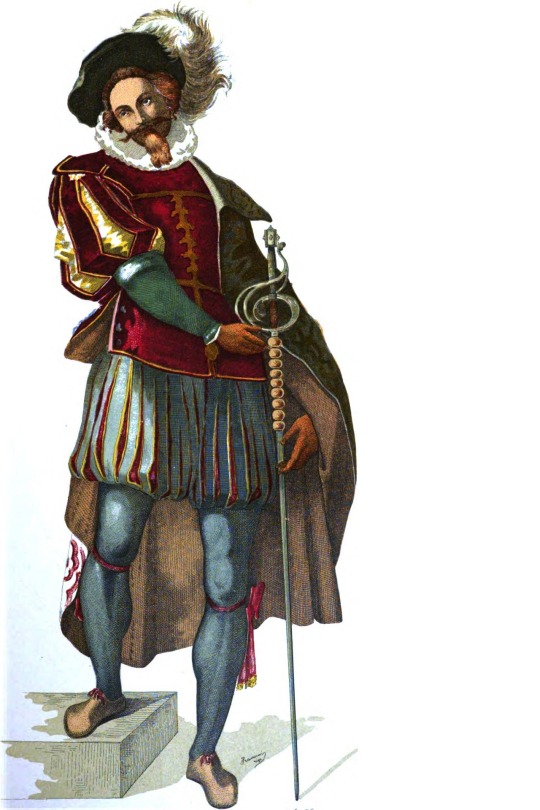
Fig. 6. Capitano Spavento, or Il Capitano, a stock character of commedia dell’arte. Here in a 19th century illustration interpreting Poccetti’s c. 1607 fresco showing the Italian actor Francesco Andreini in his costume as Capitano Spavento.
The picture was intended to be read as a staged scene involving clearly differentiated characters enacting an episode from everyday life, and there can be little doubt that for both The Cardsharps and The Fortune Teller Caravaggio drew inspiration from the conventions of popular theater and such stock characters as the bravo Capitano Spavento (fig. 6). He did, however, conspicuously avoid the element of burlesque that was part of the commedia dell'arte tradition and that was frequently taken up by his later imitators in their treatment of the same themes.
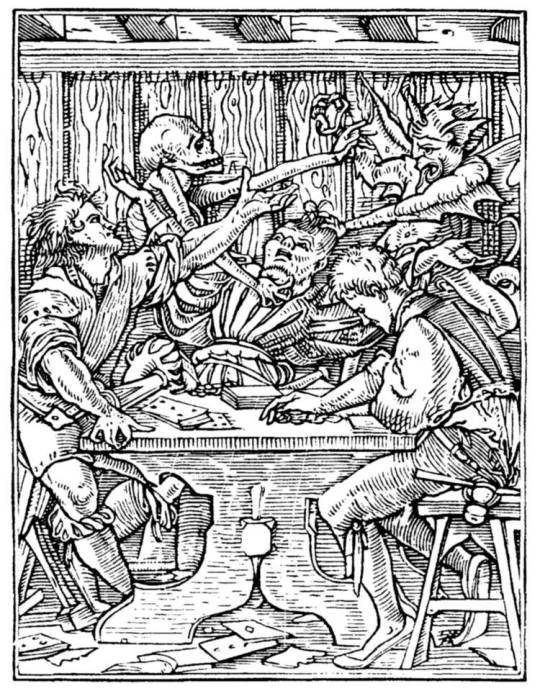
Fig. 7. Hans Holbein, “The Gamester: Death and the Devil seize upon the Gambler at his cards.” woodcut from the Dance of Death. (Basel, 1526)
While the theater was one source for Caravaggio, another was northern prints. He would appear to have studied Holbein’s woodcut illustration to the Dance of Death showing three quarreling gamblers beset by Death and the Devil (fig. 7). However, unlike Holbein and other northern artists, Caravaggio was not interested in condemning gambling as a vice but in exploiting it to expose human foibles.
~ Keith Christiansen, A Caravaggio Rediscovered: The Lute Player (The Metropolitan Museum of Art, 1990); abridged excerpt
#long post#Keith Christiansen#A Caravaggio rediscovered: The lute player#Caravaggio#art#analysis#theatre#commedia dell'arte#sleight of hand#bravo#the gambler's face cracks into a grin#Hans Holbein#rogue fashion
102 notes
·
View notes
Text
Letters to Weiss
@myshatteredmirrorsfall
May 15, 84 Dear Weiss,

Today marks a moment so bittersweet it is as if a sharp wine upon my lips. This week, we’ve received reports regarding the fate of your Atlesian venture. It is little wonder that I haven’t heard back from you at all, at least these past few months. How can you receive my letters if the kingdom you are supposed to be residing in has been sundered and sunk beneath the frozen waves?
How can you receive my letters if you are nowhere to be found, missing in action in the midst of such a catastrophe?
Even in my most idealistic of moods, I’ve always been a practical man. A realist. A realist with ambitions, but a realist nonetheless. Part of me has had to look long and hard into the mirror and come to grips with the fact that... You might very well be gone. Lost in the cataclysm that destroyed your home.
The more optimistic part of me, perhaps the foolish and clingy part of me, refuses to accept your loss so easily.
Maybe you’re still out there. I hope you’re still out there. You and Blake... and the rest of your team, I suppose. But let us be perfectly honest, who could measure up to one of my closest friends and... the love of my life, respectively? Perhaps that sounds cruel, but these are words I suspect only I will ever read over.
I have... regrets.
I was there. You saw me off. When I was in Atlas and we were ever so briefly reunited... You have no idea what it meant to me. It was the happiest I had been since the Fall of Mistral. The gods are cruel, though. It was such a short amount of time. A handful of days at most... And then the election and then Ironwood...
Gods, I left. I left you to be fugitives, assuming that you all would go underground or retreat to another kingdom. How foolish I was. It was the choice between my obligations at home, the war I find myself currently embroiled in... and helping those I’m close to on a quest that you wouldn’t even give me the scantest details on.
If I had known what was to come in the following days, I would have stayed. I can tell myself, “Who could have predicted such a tragedy?” And while that would be accurate, it is a bitter and ill-comforting pill to swallow.
I should have fought harder for you all to come back to Mistral with me, to recover and regroup in Rozumari... But no. You all refused me... You refused me. And now... you’re gone.
I have... a lot of complicated emotions regarding you and the situation we parted ways, Weiss. I love you but... you lied to me. You rebuked me when I offered you a safe haven. You followed your team leader instead of heeding my advice and now... and now you’re gone because of it. How am I supposed to handle that? Am I to be bitter? Am I to be regretful? Am I to feel guilty? I don’t know. My heart is a mess.
In a way, this is my way of mourning you, though I refuse to let you go. I’ve never been particularly good at dealing with loss. I’d rage against the heavens themselves to bring you back, but I’ve read enough fables and myths to know how that would wind up.
Today was meant to be your birthday. Perhaps, if this unworthy soul is inordinately lucky, this is your birthday. Maybe you’re celebrating it somewhere I can’t reach you. I hope so.
Gods, I hope so.
I’m sorry,

#myshatteredmirrorsfall#;renatus#;letters to weiss#s; the power couple (renatus x weiss)#v; civil war (84 to 88 PW)
5 notes
·
View notes